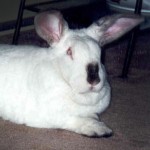
Domestic rabbits are often overfed by their owners. Your rabbit needs a good diet and plenty of exercise for good health. Over feeding is the leading cause of rabbits being overweight, which can result in medical issues as a result. Maintaining a healthy weight can help your rabbit live a long happy life! Weigh your rabbit monthly and note any increases or decreases and talk to your vet about your findings and concerns.
Is your rabbit an appropriate weight?
How can you tell if your rabbit is an ideal weight? With so many different breeds, and mixed breeds, there is no standard set weight for a rabbit. Your vet can help you determine if your rabbits body score and if their weight is a concern (too low or too high). A primary location for fat on a rabbit is in their belly. If you run your hands along the side of your rabbit, when you reach their ribs, you should be able to feel a slight inward slope which is their waist. Rabbits that are overweight, will have an area that balloons out rather than going in.
Obese rabbits
- Have high resting heart rates
- Have a difficult time grooming themselves
- Often cannot reach to consume their caecotrophs (cecals)
required to help maintain their health - Can have soft stools
- Growth of a dewlap
- Have an increased risk of arthritis
- Are more prone to having sludgy urine or cystitis
- Are more prone to sore hocks
- Are at risk of developing cardiac hypertrophy and hypertension
- Are at higher risk going under anesthetic
Balanced diet
A healthy diet is essential for a healthy rabbit! A rabbit is meant to eat hay and vegetables. Deviate too far from this diet and problems may occur. A balanced diet includes:
- HAY –unlimited quantities (timothy for adults, alfalfa for young rabbits)
- VEGETABLES – 2 cups per 6 lbs of weight, serving 3 or more kinds daily
- PELLETS – 1/4 cup per 5 – 7 lbs of bunny
- FRUIT/TREATS – 1 tbsp per 5 lbs of bunny (they do not need daily treats!)
AVOID:
- Nuts, seeds, corn – high in fat, can cause blockages
- Sugar and dairy (ie yogurt drops) – rabbits are vegan
- Human snacks – not suited for rabbits
- Chocolate & raisins which can be toxic for bunnies
Changing Diet
When changing your bunny’s diet, it is essential that you make changes slowly! Monitor your bunny to make sure he or she is eating as some will refuse at first if they are not offered their favourite foods. Any decrease in food amounts need to be done extremely slowly and with the guidance of your vet. Loosing weight too quickly can harm their liver & cause many health consequences. Make sure your rabbit always has access to lots of timothy hay and exercise!
Preferred foods
HAY – Grass Hays such as Timothy, Brome, Oat and Orchard
VEGETABLES – Romaine, Red, or Green Lettuce, Parsley, Basil, Dill, Dandelion, Carrot tops, Endive, Escarole, radicchio.
PELLETS – Timothy based pellets for adult rabbits (alfalfa for babies). Avoid pellets with treats, dried fruits, seeds etc in the bag.
FRUIT/TREATS (sparingly only!!) – Banana, Strawberries, Watermelon, Apple, Papaya, Dried cranberries (sugar and oil free), Carrot
Exercise
Rabbits need safe activities to keep their bodies and minds healthy. Healthy outlets must be provided to bunnies for indulging their desire and need to chew, dig, climb, fling, hide, hop and run.
Provide your bunny with lots of toys and a large bunny proofed area to roam. Toys do not have to be expensive and can even be made!
Here are some suggestions:
- Empty toilet or paper towel tubes stuffed with hay
- Paper bags with or without bunny treats in them (make a bunny pinata)
- Cardboard boxes and construction concrete forms made into condos and tunnels and frequently rearranged
- Stuffed animals without parts that can be chewed off and choked on
- Hard plastic rattles, keys and rings (baby toys)
- Fleece towels/blankets (watch for signs of chewing)
- Untreated apple or willow branches
- Untreated wicker, grass baskets or mats
- Pinecones washed and dried for at least 4 months





